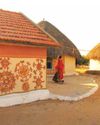Water crisis is perhaps not a recent phenomenon. From time immemorial, the Indian subcontinent has witnessed deluges and famines. Each region has had an indigenous system to preserve the excesses or mitigate scarcity. It is increasingly critical to not only revive this past but also conserve and subsequently build for the future by taking a leaf from the chapters of yore.

The legacy of the traditional water architecture of the Indian sub-continent is supremely rich, largely dormant yet, highly resilient. The exquisite aqua-structures of the Indian antiquity, built as ecosystems to access subterranean water or to harvest rainwater, were an integral part of Indian communities from the 2nd century A.D. till the beginning of the 20th century.
Water, in ancient India, commanded the deepest reverence, especially in the water scarce regions where its availability hinged on the caprice of nature. To water, man brought the best of his skills; as offering in worship by constructing water buildings as temples to water; replete with intricate carvings and sculptures and served as socio-cultural spaces. The majority of these were sponsored by philanthropists or public and built with community participation. The cultural perspective around these sacred water structures were sewn into the daily life of people, ostensibly as social and religious rituals and symbols to manage their operation & maintenance and also as a hedge against desecration of these revered structures.
The huge repertoire of the traditional water bodies ‘bawari’, ‘kund’, ‘jhalara’, ‘tanka’, ‘bodi’, ‘barav’, wells, etc. managed by communities with a participatory and democratic approach, was relegated in favour of a centralized State controlled modern water infrastructure. This, as a solely independent dispensation, has proven to be dismally insufficient in meeting the fresh-water requirement of a burgeoning population.
This story is from the October 2017 edition of Indian Architect & Builder.
Start your 7-day Magzter GOLD free trial to access thousands of curated premium stories, and 9,000+ magazines and newspapers.
Already a subscriber ? Sign In
This story is from the October 2017 edition of Indian Architect & Builder.
Start your 7-day Magzter GOLD free trial to access thousands of curated premium stories, and 9,000+ magazines and newspapers.
Already a subscriber? Sign In

Interlacing Perspectives
‘Meraki-2019’ A visionary Seminar series presented by Dr.Baliram Hiray College of Architecture, Bandra(East), Mumbai.

Facilitating A Community Through Architectural Practice
The humble, self-designed, self-built and organically planned home built by the majority of the world population rarely gets appreciated and critiqued as a viable lesson in architectural design.

The Art Of Solving Problems Creatively
The practice of architecture is perhaps incomplete without the complement of a variety of other arts.

Upcycling towards a playful tomorrow
Play is like the middle child, often forgotten, and always taking a back seat. For young kids, play can simply be running around, armwrestling with friends, building sandcastles on the beach, or singing popular music tracks in the shower.

Balancing The Poetics And Pragmatism Of Everyday Design
Humanity is faced with an oxymoronic crisis. The crisis involves the earth, the environment, impending looms of climate change, deforestation, loss of species, dwindling resources etc.

Just Give Me Some Space: Discussions And Beyond
Just Give Me Some Space (JGMSS) is Suha Riyaz Khopatkar’s debut book that paints a portrait of the dynamic life of an architecture student.

The Next In Vernacular Architecture
Architecture has become a capitalist.

Rethinking The Future: Architecture And Its Education
“I want to be like animals, the bird makes a nest in one or two days, the rat digs a hole in a night, but intelligent humans like us spend 30 years to have a house, that’s wrong.” - Jon Jandai

Uniting The Human-Scale With The City-Scale
London-based architect Usman Haque is famed for his interactive architectural systems, and for his exploration of newer, more effective ways of creating human engagement and interaction through his designs. Indian Architect & Builder caught up with him, to quiz him on a variety of topics such as his journey as an architect, his inspirations and philosophies, architects using the digital revolution to their advantage, and more!

Framing spaces
Almost every architect also doubles as a photographer or at least an enthusiast.